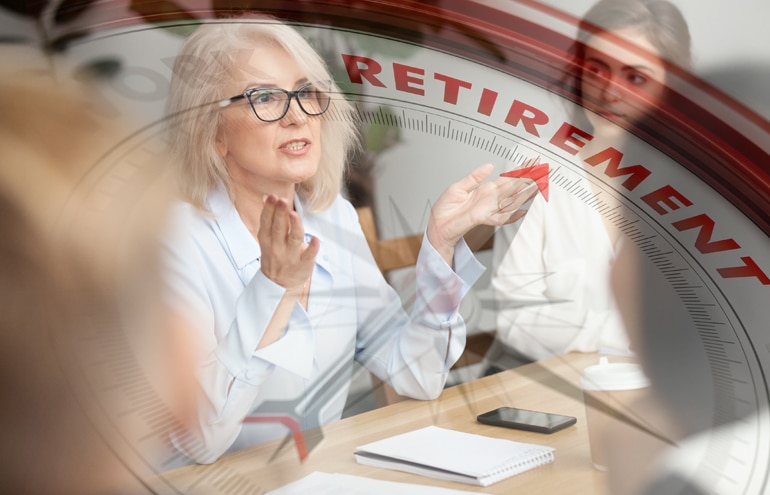Smart firms recognize that retired partners can benefit the firm even after they leave and take steps to keep them engaged. Here’s how.

Table of contents
At least 70 percent of large law firms and many midsize and small firms have alumni programs for lawyers who were once part of the firm. The alumni include both lawyers who have left for other jobs and partners who have retired from the firm. These programs keep them connected to the firm through newsletters, social gatherings, CLE offerings, job postings and other features.
While these activities may promote ongoing goodwill, alumni programs have a clear business purpose: to maintain a network of known lawyers who are working productively in other places and are, therefore, possible sources of future work and talent referrals for the firm.
Former partners who have retired rather than moved to another job are naturally included in the alumni program and invited to alumni events. However, alumni programs focus primarily on those who are still in the labor force or trying to return to it. Firms often assume that partners who are senior and retire are inactive and disengaged. They are associated with the past, not the future, which is where the firm understandably concentrates its effort. So, while they may be welcome at alumni events, little is done specifically for them.
More than a third of law firm equity partners today are at retirement age, but few “retire” in the old-fashioned sense. Increasing longevity and better health care make it possible for them to stay productive well into their 70s and beyond. If they stop being law firm partners, they can and frequently do shift their talents into other forms of work. They start new firms and businesses, join nonprofit boards and public service organizations, or use their talents and skills in countless other ways. Even if they spend their time in more leisurely pursuits, they stay active in their old communities and enter new professional and social circles.
Retired Partners Can Continue to Benefit Your Firm
Some retired partners have little interest in staying involved in the firm after they leave. They might attend alumni events and stay informed about the firm through newsletters and updates, but nothing more. But other retired partners have much to contribute and would — or might, if asked — like to stay involved in the firm. In addition to supporting lawyers’ professional development as mentors, teachers, pro bono supervisors, role models and career advisors, retired partners can be sources of business and talent referrals. Smart firms recognize that these partners can continue to benefit the firm and take steps to keep them engaged.
This effort is not simply a matter of goodwill, though partners who built the firm and devoted their careers to it certainly deserve that. It fulfills the alumni program’s business objectives as well because these retired partners can promote multiple goals:
1. They Strengthen the Firm’s Brand
There is no better firm ambassador than a highly regarded lawyer with a long career and fine reputation who speaks with pride of the firm he or she built and entrusted to the next generation. Making sure this ambassador has current information about the firm and knows the lawyers who work there now makes it easier for them to speak proudly and authoritatively.
2. They Remain Referral Sources
Senior partners may retire from the firm but that doesn’t mean they retire from other organizations. Many stay active and well connected in the business community. They sit on boards, advise established companies and startups, are involved in political activities, and maintain friendships with former clients. Many of their contacts and friends have legal needs and ask for referrals.
3. They Are Sources of Talent Referrals
Senior lawyers are often asked for career advice by their children, grandchildren and friends. Many teach in law schools and work as mentors and supervisors in legal clinics. They can direct talented students and young lawyers to your firm.
4. They Have Wisdom to Share
Your firm can benefit from the wisdom of elders in many ways. Retired partners can serve as mentors to firm leaders, new partners or young lawyers. They can advise the firm on client matters or firm strategy. Although they grew up as lawyers in a different business environment, they have weathered many kinds of changes and disruptions. They acquired knowledge, insights and understanding about leadership, business and people that has immense value for your firm today.
Faegre Baker Daniels’ Retired Partners Group
Faegre Baker Daniels presents a good example of how a law firm can maintain mutually beneficial connections with its retired alumni. FaegreBD sponsors a Retired Partners Group. About 40 lawyers are active in the group, which is run by a former litigation partner. Group members make themselves available as advisors to younger firm lawyers and as mentors to other retiring partners. They stay involved in certain charitable and community-based firm activities, such as the United Way Campaign, and serve as “brand ambassadors” in the community on the firm’s behalf. Some specifics:
- Twice a year, group members get together to discuss whatever interests them.
- The firm’s managing partner meets with the Retired Partners Group once a year to discuss the state of the firm and new developments in law practice and the legal marketplace.
- Throughout the year, the managing partner sends specialized communications and invitations to events that might interest them.
- FaegreBD also hosts a listserve where retired partners can share news, updates and inquiries.
- The firm’s alumni newsletter highlights what retired partners are doing, showing that they remain vital, productive and good role models for others.
- The firm also invites retired partners to assist in the training of young lawyers, and participate in firm affinity groups with current lawyers.
More Ideas for Retired Partners
Other law firms could do all these things and more. Here are 10 additional suggestions:
- Include retired partners in designing and planning activities for the firm’s general alumni program.
- Develop programming by and for retired (and retiring) partners on various topics of interest to them (e.g., how to transfer their skills to new contexts, how to manage Social Security and Medicare, issues about grandchildren, adventure travel for seniors, engaging in philanthropy, starting a new business, finding freelance work, starting a podcast).
- Host a “retirement portal” on the firm website with features of particular interest to retired and retiring partners, including financial planning resources, information on encore careers and opportunities for advanced study.
- Offer a list of retirement coaches who can help partners plan for and transition into the next stage of their lives.
- Establish a peer mentoring panel through which senior and retired partners can seek mentoring and advice from other retired partners.
- Create mentoring circles where retired partners can come together regularly to discuss topics of mutual interest. Provide a conference room and lunch.
- Invite retired alumni to contribute to firm programs and publications. They might address career issues (e.g., taking a long view of one’s career, or life after law practice) or more substantive topics (e.g., perspectives on the changes in the legal industry or a particular field of law).
- Include them on advisory or oversight committees, such as those dealing with diversity and inclusion.
- Invite them to attend a business or social event where their former clients will be present.
- Hold social events for retired partners, either independent of or during other alumni events.
An Opportunity to Benefit All
Providing resources and support to retired partners and inviting them to help the firm in suitable ways produces benefits for all. It makes the retirees feel welcome and valued, and by continuing to share their wisdom, referrals and social capital, the firm and its people are enriched.
Considering how little time and money it takes, all firms should more purposefully engage retired partners in their alumni programs.
















